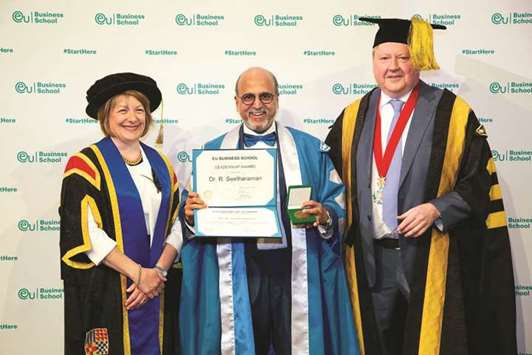The future of the banking industry rests on two key enablers — digital governance and sustainable development, according to Doha Bank CEO Dr R Seetharaman, who was honoured recently with the EU Business School Leadership Award.
“The key areas that require attention by leaders include realignment of business model in accordance with structural changes in environment, building strong corporate image, sustaining growth, grooming people for global environment, leveraging technology, giving back to society, and managing stakeholder expectations,” said Seetharaman, who received the award at the EU Munich Commencement Ceremony.
The award was bestowed on Seetharaman “in recognition of his dedication to inspire passion, direction, and determination in young and fellow business people.”
The award also acknowledged “his integrity, innovative spirit, and commitment to promote sustainable development and economic prosperity, which greatly inspired community,” Doha Bank said in a statement.
During the awarding ceremony, Seetharaman spoke on the areas where leaders should focus in the light of changing dynamics in the global and regional space.
“Fintech, Internet of Things, block chain, and artificial intelligence are some of the major technological developments. Robotics, enabled by AI and machine learning, is proving to be a game changer that can bring unique operational efficiencies to the financial services industry.
“After the explosive growth of digital payments in 2017, Fintech companies are gearing up to ride on block chain and expand their portfolio of app-based services ranging from consumer lending to insurance products to cross-border remittances,” he said.
Seetharaman noted that small and medium-sized enterprises (SMEs) should consider technology in segments such as smartphones for customer interactions. A true digital bank is built on the value proposition that most products and services are delivered digitally, he pointed out.
“Its customers expect to use digital channels for their day-to-day banking activities. In times of disruption, the choice to become a member of an emerging world community is so important — now, more than ever. To combat the rise in populism, we need schools to promote global citizenship, respect for diversity, and critical thinking.
“There are four economic systems that provide opportunities from sustainable development goals: food, agriculture, health, and well-being. Seizing such opportunities will require revitalised and enhanced multi-stakeholder partnerships,” he added.

Seetharaman receiving the award during the EU Munich Commencement Ceremony.
